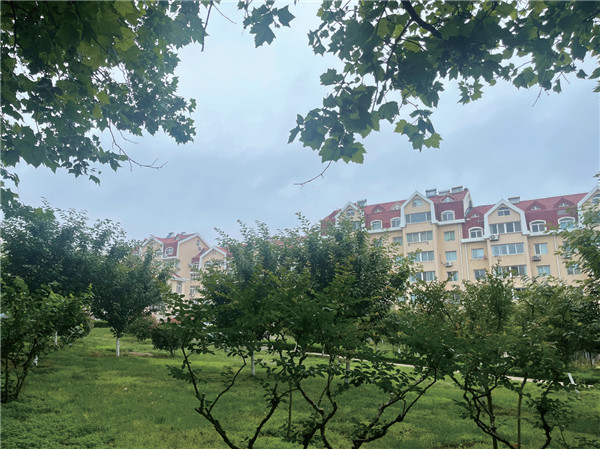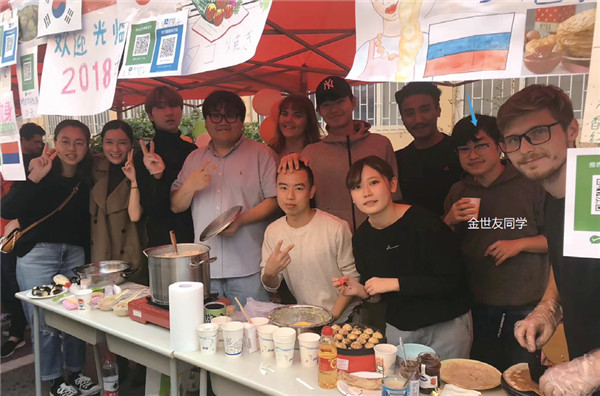中國人的家國情懷
〔南韓〕 金世友 青島大學

“家是最小國,國是千萬家。”成龍演唱的《國家》用最樸實的歌詞道出了對國與家深厚的情感。中國人的家國情懷似乎是沿著歷史的長河一脈相承下來的,從杜甫的“國破山河在,城春草木深”“烽火連三月,家書抵萬金”到周總理的“為中華之崛起而讀書”。從杜甫的熱愛祖國、眷念家人的情懷到周總理的博大胸襟和遠大志向,無不體現了中國人刻在骨子裏的家國情懷。
2020年初,一場突如其來的疫情打破了我們原本平靜的生活,也從側面讓我體會到了中國人的民族團結及“舍小家,為大家”的精神。為了人民的生命安全及疫情的管控,中國政府在疫情發生後,馬上採取了“封鎖”武漢的決策,避免了大規模人口流動導致疫情暴髮式增長。原本應該搭載春運回鄉旅客的列車上,搭載的卻滿是來自四面八方的救援物資與前來支援的醫療人員和志願者。原本應該和家人其樂融融地吃著年夜飯的在外求學的學子及在外務工人員則在自願隔離中獨自一人跨過了一個不平凡的年。
得益於他們為了大家的安全而放棄小家的團圓,中國的疫情得到了有效的控制,並使中國成為有效治理疫情的典範國家。也得益於此,今年的“五一黃金周”的中國國內旅行出遊人數竟達到了2.3億人次,實現了旅遊收入1132.3億元(文化和旅遊部數據中心統計)的奇跡。和我一起在中國留學的一對俄羅斯情侶也趁著這次五一假期去了俄羅斯聯邦駐廣州總領事館辦理了結婚手續,還去了海南度過了為期五天的蜜月。祝福他們!也真羨慕他們!
現如今一些國家依然陷於疫情的水深火熱之中,與中國的“國泰民安,山河無恙”形成了十分鮮明的對比。這裡並沒有嘲笑任何國家或幸災樂禍的意思,只是中國人能夠在魚與熊掌不可兼得時,以大局為重,遵從政府管理措施,“舍小家,為大家”。中國人的這种家國情懷是值得各國人民學習的。

青島大學 / 金世友提供
説到家國情懷,不得不提一句我在南韓亞洲大學認識的一位來自湖南省的博士,他雖家境貧寒,但成績優異,是靠著獎學金一路讀到博士的,生活非常簡樸但是學習非常努力。我到中國留學後就與他失去了聯繫,直到一次偶然的機會,我從其他朋友那裏得知這位博士已經畢業回到中國了。我以為他會憑藉自己的文憑去找一份高薪的工作,改善他的家境與生活水準,但朋友的話令我瞬間對那位博士肅然起敬,朋友説:“他回到了他鄉下的老家,成為一名鄉村教師。”那位博士常把“為中華之崛起而讀書”和“再窮不能窮教育”挂在嘴邊,我總是不以為然,以為他只是開玩笑罷了,沒想到他真的這麼去做了。更沒想到從一個普普通通的農村學生身上,我也能體會到中國人刻在骨子裏的家國情懷。

參加校園活動(右二為金 世友)
“此生無悔入華夏,來世還做中國人”,這是我在中國的網路媒體上經常看到的一條評論。無論是抖音還是微網志,都能看到這樣的評論,由衷地表達了中國人對祖國母親的熱愛和身為中國人的自豪。泱泱華夏,巍巍中華,雖歷經戰亂,飽經滄桑,但華夏人卻將華夏魂傳承了下來,歷經韆鞦萬代卻經久不息。
The Familial and National Feelings of Chinese People
〔Republic of Korea〕 Kim Sewoo, Qingdao University
“Home is the smallest country, and country is the family for tens of thousands.” Jackie Chan’s song Country expresses his deep feelings for his country and family through the simplest lyrics. Chinese people’s feelings for home and country seem to have come down in a continuous line along the long river of history, from poet Du Fu’s “On war-torn land streams flow and mountains stand; In vernal town grass and weeds are overgrown”, “The beacon fire has gone higher and higher; Words from household are worth their weight in gold”, to Premier Zhou Enlai’s “study for the rise of China”. Both Du’s love for his motherland and nostalgia for his family and Premier Zhou’s broad-mindedness and lofty ambition reflect the family and national feelings engraved in the bones of Chinese people.
At the beginning of 2020, a sudden epidemic broke the peaceful life, which, however, also made me realize the national unity of the Chinese people and the spirit of “sacrifice the small family for everyone”. For the sake of the safety of people’s lives and the control of the epidemic, the Chinese government adopted the decision of locking down Wuhan immediately after the outbreak, avoiding the explosive growth of the epidemic to be caused by large-scale population mobility. The trains, which had been supposed to carry passengers returning to their hometown during the Spring Festival, were full of relief supplies from all directions and medical personnel and volunteers who came to support. Students and migrant workers who had been supposed to have a happy New Year’s Eve dinner with their families went through an extraordinary year alone in voluntary quarantine.
Thanks to their giving up the reunion of small families for the sake of everyone’s safety, the epidemic in China has been effectively controlled, which has also made China a model country for effective management of the epidemic. Also thanks to this, the number of domestic tourists in China during this year’s May Day “Golden Week” reached 230 million, realizing the miracle of tourism revenue of 113.23 billion yuan (statistics from the data center of the Ministry of Culture and Tourism). A Russian couple who were studying in China with me also took advantage of the May Day holidays to go to the Consulate General of the Russian Federation in Guangzhou to go through the marriage formalities, and they also went to Hainan for a five-day sweet honeymoon. Bless them! I really envy them!
Nowadays, some countries are still trapped in the plight of the epidemic, which is in sharp contrast to China’s “prosperous land and safe people”. I don’t mean to laugh at any country or to gloat over their misfortune. But it is worth learning that the Chinese can put the overall situation first, “sacrifice the small families for everyone”, and comply with the government’s management measures, when the personal interests conflict with the national ones.
When it comes to the feelings for home and country, I have to mention a doctor from Hunan Province whom I got to know at the Asian University in South Korea. Although his family was poor, his grades were excellent and he earned scholarships all the way through doctorate. His life was very simple, but he studied very hard. I had lost all information about him after I went to study in China, until by chance, I learned from other friends that the doctor has graduated and returned to China. I thought he would use his diploma to find a high-paying job to improve his family situation and living standards, but my friend’s words made me respect the doctor instantly. My friend said, “He went back to his hometown in the country and has become a village teacher.” The doctor had often talked about “Study for the rise of China” and “Education is the last thing to sacrifice”. I never took it seriously, thinking he was just joking and never expecting him to do so. Never had I expected that I could also feel the family and national feelings engraved in the bones of the Chinese people in an ordinary rural student.
“I have no regret to be a Chinese in this life, and I still want to be a Chinese in the next life.” This is a comment I often see in China’s online media, whether on TikTok or Weibo. It sincerely expresses Chinese people’s love for the motherland and the pride of being Chinese. Great China, towering China. Despite of wars and vicissitudes, the Chinese people have inherited the Chinese soul, and will pass it on to future generations, without stopping.



